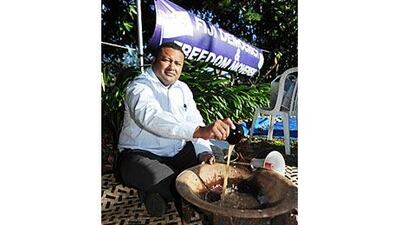CAIRNS, AUSTRALIA // Fiji's military-led government has again rejected calls for a swift return to democracy from its increasingly anxious South Pacific neighbours. Commodore Frank Bainimarama seized power in Fiji in a bloodless coup in December 2006 but has repeatedly ignored international demands to hold fresh elections. His grip on power has divided the Pacific Islands Forum, the region's premier political grouping, where opinions at a recent summit in Cairns have ranged from warm sympathy to Cmdre Bainimarama's ambitions to outright hostility to his disregard for human rights.
Earlier this year the forum suspended Fiji, which was banned from attending the conference in Queensland. Although the sanction infuriated the military, there is scant evidence it has any intention of bending to such diplomatic pressure. As interim leader, the commodore has maintained that he was forced to oust a dishonest administration led by the former hard-line nationalist prime minister Laisenia Qarase, who was accused of enacting racist policies against the Indian minority. The army has since embarked on what it calls a long-term plan to cleanse public life of sleaze and deceit.
Adding their vociferous views to the debate in Cairns were activists from the Fiji Democracy and Freedom Movement, a network of expatriate campaigners based in Melbourne, Canberra, Sydney, Brisbane and Townsville. "We are angry and upset at the military dictatorship that is now ruling Fiji," said Usaia Peter Waqatairewa, the movement's president. "They call themselves an interim government but corruption is rampant, they oppose any dissent and they censored the media. Freedom of speech and expression are strongly suppressed. It is like living in some communist country of the Cold War era."
Pro-democracy demonstrators have argued that the military takeover has wrecked the economy, where tourism and sugar cane industries have collapsed along with the health and education sectors. A combination of international sanctions, unease among foreign investors and a rapidly deteriorating reputation overseas has been widely blamed for the worsening malaise. The December 2006 uprising was Fiji's fourth coup in two decades. Mr Waqatairewa believes they have condemned the country that was a political and economic hub for the South Pacific to years of instability.
"We are sick of it. Every time there is a coup it takes the country back 10 or 20 years. If there were no coups in 1987 our living standard and economy would probably be on par with New Zealand," he said amid a small group of protesters who had gathered outside the meeting in Cairns. In a final communiqué, forum delegates voiced their deepening frustration with the situation in Fiji. "Leaders strongly condemned the actions of the Fiji military regime which have led to a severe deterioration in basic liberties and democratic institutions ... including the abrogation of the constitution, the imposition of media controls, restrictions on freedom of assembly, and the ongoing erosion to the traditional pillars of Fijian civil society, including the churches and chiefs. They deplored the recent detentions of church leaders by the regime," the statement said.
Toke Talagi, the premier of Niue, a Polynesian island in the South Pacific Ocean, had more forthright views and urged Fijians to stage a peaceful revolution. "Perhaps citizens of Fiji must now rise to challenge the undemocratic rule of the military regime and restore democracy for the sake of their children," said Mr Talagi. "After all, the people of Fiji must take responsibility for the reconstruction and the future and their own destiny."
However, Fiji is not without friends in the region. Its Melanesian cousins in Vanuatu, the Solomon Islands and Papua New Guinea had wanted the Pacific Islands Forum to reverse its suspension of Fiji, insisting that Cmdre Bainimarama could be trusted to repair his damaged nation and to hold elections by 2014. The thinking was that Fiji would be more receptive to gentle persuasion if it were reinstated to the forum, while it would risk further isolation if it remained cut adrift.
"I don't think you can close off the leaders of a country who are obviously grappling with a major problem. If we close the door then it makes things much, much more difficult," said Sir John Kaputin, the former foreign minister of Papua New Guinea, who is currently secretary general of the African, Caribbean and Pacific Group of States. "We have had discussions with them. The reality is the country is in trouble and we should attempt to help them bring them back to democracy," Mr Kaputin added.
Ultimately, the forum decided that Fiji would not be readmitted but campaigners want even greater international pressure applied to Cmdre Bainimarama's interim administration, including banning Fijian troops from UN peace missions. "There is a lot of hypocrisy in having soldiers serving with the UN as peacekeepers when they are running around at home terrorising the whole neighbourhood and then taking them off to some trouble spot in the Middle East," said Mr Waqatairewa.
pmercer@thenational.ae

